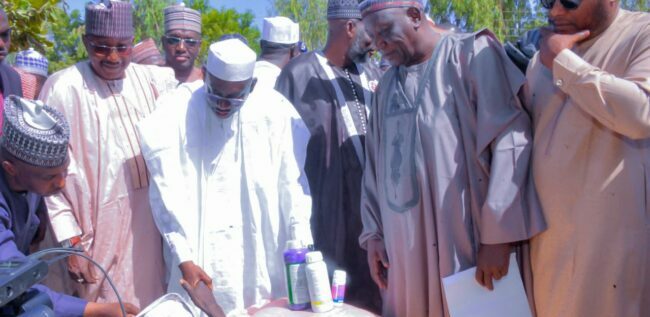Jigawa state governor Malam Umar Namadi released the sum of N1.5 billion as a counterpart found for the COVID-19 Economic Recovery and Economic Stimulus programme under the World Bank project
The governor announced in a speech delivered at the flagging off of the distribution of the multi-million Naira agricultural inputs to dry season farmers for upcoming rice dry season farming in the state.
Malam Umar Namadi explained that a total of 1,950 farmers were drawn from various Fadama farmers associations across the state and were to benefit from government support as part of efforts to improve food production to ensure food security in the country.
The governor explained that the state government earlier released its counterpart found under the NG CARES on II-Fadama, where the beneficiary drowned for the dry season farming in the state.
According to the governor, this project is under the JIgawa COVID-19 Action Recovery and Economic Stimulus (J-Cares) programme under the supervision and targeting, selection, and implementation monitoring committee of NG-CARES to avoid any problems.
Malam Namadi also announced another release of N1.5 billion for the next target distribution. He said the committee is not just a temporary one but a standing one to serve till the end of the project.
He then assured more empowerment programmes that aim to reduce unemployment and extreme poverty among the people in the state.
While delivering his speech, the chairman of the committee, Dr Saifullahi Umar, explained that the committee was constituted by the governor to develop an equitable, transparent, and accessible process for beneficiary selection and implementation monitoring.
According to him, we visited a total of 120 communities across 27 local governments within 25 days, and about 1,950 beneficiaries were selected from poor and vulnerable, hard-to-reach areas with little or no government presence.
“We considered factors such as poverty and vulnerability, social status, and community needs to ascertain the most deserving recipients,” Dr Saifullahi said.
He maintained that the breakdown of the beneficiaries per package allocation was 320 rice, 160 maize, 170 millet, 120 sorghum, 99 sheep, 320 goats, 193 water pumps, 138 processing machines, and 86 broiler-day-old chicks.
The chairman, who promised more support to the vulnerable, urged the beneficiaries to use the package appropriately to achieve the desired goals.
Speaking to our reporter, some of the beneficiaries, Malam Mai Unguwa Sule, Harira Hadi, and Maimuna Sa’idu, appreciated the efforts and promised to utilise the package appropriately.
YOU SHOULD NOT MISS THESE HEADLINES FROM TheWitness
FULL LIST: 45 visa-free countries Nigerian passport can travel in 2024
Nigeria sits behind Ghana, Guinea, Kenya, Lesotho, Morocco, Benin Republic and Namibia which are at…
How my brother and I became professor same day in same varsity —UNILORIN don
Recently, two brothers –Ahmed Oloduowo Ameen and Mubarak Oloduowo Ameen– were promoted to…
‘I expected N2,000 as my share from sale of human head we got at Saki cemetery’
Thirty-two-year-old Alli and Abdullahi, aged 35, who were the two suspects arrested by…
Why Port Harcourt refinery is yet to start production—Soneye, NNPCL Chief Comm Officer
Mr Femi Soneye is the Chief Corporate Communications Officer (CCCO) of the…
Fear women, fair women and Minister Ojo
Betta Edu, Sadiya Umar-Farouq and Halima Shehu are the reigning women in our…
What you should know about play
ers in Nigerian 2024 AFCON team
The Nigerian football team have appeared in the finals of the Africa Cup of Nations on twenty different occasions. Nigeria has…







